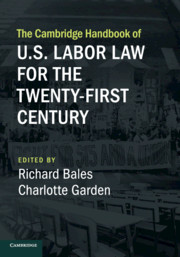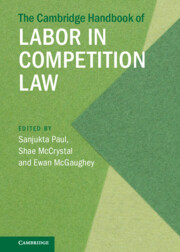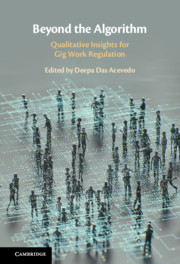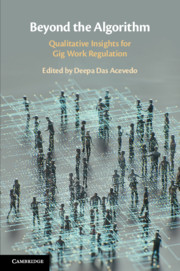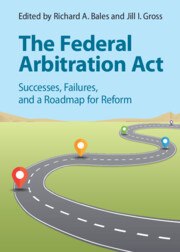The Cambridge Handbook of U.S. Labor Law for the Twenty-First Century
Over the last fifty years in the United States, unions have been in deep decline, while income and wealth inequality have grown. In this timely work, editors Richard Bales and Charlotte Garden - with a roster of thirty-five leading labor scholars - analyze these trends and show how they are linked. Designed to appeal to those being introduced to the field as well as experts seeking new insights, this book demonstrates how federal labor law is failing today's workers and disempowering unions; how union jobs pay better than nonunion jobs and help to increase the wages of even nonunion workers; and how, when union jobs vanish, the wage premium also vanishes. At the same time, the book offers a range of solutions, from the radical, such as a complete overhaul of federal labor law, to the incremental, including reforms that could be undertaken by federal agencies on their own.
- Advances an ambitious agenda for labor law reform that will appeal to anyone concerned with the decline of American unions or the increase in income inequality
- Approaches the challenges of labor law reform from many perspectives, and with an eye towards different policy levers, allowing the reader to judge which paths are most appropriate
- Frames specific problems contributing to unions' declines and then proposes different types of reforms to address those problems
Reviews & endorsements
'Charlotte Garden and Rick Bales have brought together an impressive group of experts to provide a comprehensive look at how our labor laws could and should be strengthened to give workers more collective bargaining power. This book is a valuable contribution to the public debate around a critically important issue at a critically important time.' Lynn Rhineheart, Economic Policy Institute, and former general counsel, AFL-CIO
'At a time of increasing income inequality and declining union power, this much-needed volume provides many smart and provocative ideas on how to overhaul our nation’s labor laws in order to strengthen unions, increase worker power, and, most important, lift America’s more than 150 million workers. In this book, a who’s who of labor experts provide one thoughtful essay after another on many of the key issues that unions and workers face today.' Steven Greenhouse, long-time labor journalist and author of Beaten Down, Worked Up: The Past, Present, and Future of American Labor
'In a year of teacher strikes for the public good, private-sector flight attendants standing strong on behalf of locked-out federal workers, and New York state farmworkers just winning a century-long struggle for collective bargaining rights, this book is exceptionally timely and relevant. Richard Bates and Charlotte Garden have chosen an outstanding group of scholars who are refreshingly forward-looking while still being grounded in the daily reality faced by workers and unions.' Kate Bronfenbrenner, Cornell University
'The Cambridge Handbook of US Labor Law for the Twenty-First Century is an important resource. It provides a range of opinion and is rich in thought-provoking ideas. It should soon be on the bookshelves of practitioners, scholars, policy makers, and activists - indeed, anyone interested in labor law and policy, worker rights and activism, unions and employers, collective bargaining, economic fairness, and democracy.' Wilma B. Liebman, former chairman, National Labor Relations Board, and professor, author, and advisor on labor law and workplace policy
‘The Cambridge Handbook of U.S. Labor Law for the Twenty-First Century represents a highly valuable tool for both the scholars and the practicing lawyers to address practical issues and de lege ferenda policies surveying a wide range of topics in a synthetic and clear way, whose analysis is frequently neglected or underestimated by most.’ Prof. Dr Andrea Borroni, Contemporary Labour Law Review
‘The Handbook of US Labor Law for the Twenty-First Century performs several valuable roles: it is a primer on the current state of the organized labor movement and on the economic, political, social, and cultural consequences of its weakness … In assembling such a large and diverse group of contributors, the Handbook can realistically claim to represent the best of what is on offer in addressing all of these crucial topics for discussion and action.’ Christopher Tomlins, Law & Social Inquiry
Product details
November 2019Adobe eBook Reader
9781108583251
0 pages
2 b/w illus.
This ISBN is for an eBook version which is distributed on our behalf by a third party.
Table of Contents
- List of contributors
- Preface
- Acknowledgements
- Part I. Introduction:
- 1. Union trends Richard Bales
- 2. The consequences of union decline Jake Rosenfeld
- Part II. Labor Law Is Out of Date:
- 3. Yesterday's labor law and today's challenges Cynthia Estlund
- 4. The National Labor Relations Board in the twenty-first century William B. Gould, IV
- 5. Beyond the race to the bottom: reforming labor law preemption to allow state experimentation Charlotte Garden
- 6. Union rights for all: towards sectoral bargaining in the United States Kate Andrias
- 7. Public sector innovations: valuing voice Ann C. Hodges and Martin H. Malin
- 8. Combatting union monopoly power: the contrast between pre- and post-new deal legal regimes Richard A. Epstein
- 9. The case for repealing the firm exemption to antitrust (a modest proposal
- or, a response to Professor Epstein) Sanjukta Paul
- 10. Make labor organizing a civil right Richard Kahlenberg and Moshe Marvit
- Part III. The 'Fissured' Workplace:
- 11. Some problems with NLRA coverage: independent contractors and joint employers Joseph Slater
- 12. Reinventing employers Jeffrey Hirsch
- 13. The problem of 'misclassification' or how to define who is an 'employee' under protective legislation in the information age Kenneth G. Dau-Schmidt
- 14. Rupture and invention: the changing nature of work and the implications for social policy Katherine V. W. Stone
- 15. Contemplating new categories of workers: technology and the fissured workplace Miriam A. Cherry
- 16. Balancing flexibility and rigidity: do unions make sense in the on-demand economy? Seth Oranburg and Liya Palagashvili
- Part IV. Barriers to Forming a Collective Bargaining Relationship:
- 17. Tactical mismatch in union organizing drives Charlotte Garden
- 18. The power of place Michael M. Oswalt
- 19. Assembly and collective rights Marion Crain
- 20. Leveraging secondary activity within and outside legal boundaries Anne Marie Lofaso
- 21. Captive audience meetings: the right not to attend Paul M. Secunda
- Part V. Barriers to Bargaining a Good Contract:
- 22. Obtaining a first contract after winning recognition David Rosenfeld
- 23. Advancing global labor standards: potential and limits of international labor law for worker-rights advocacy in the United States Lance Compa
- 24. Organizing for workplace rights when immigration law discourages it Leticia M. Saucedo
- 25. The central role of the right to strike Julius Getman
- 26. Organizational power for workers within the firm Matthew T. Bodie
- 27. Returning members-only collective bargaining to the American workplace: how to restore labor's countervailing power Charles J. Morris: Part VI. Unions, Civil Society, and Culture:
- 28. Can labor law reform encourage robust economic democracy? Brishen Rogers
- 29. Union security for the twenty-first century Catherine L. Fisk
- 30. Union membership and the Ghent system Matthew Dimick
- 31. Principled hope: labor law reform from an alt-labor perspective Cesar F. Rosado Marzan
- 32. Politically engaged unionism: the culinary workers union in Las Vegas Ruben J. Garcia
- 33. Union commitment to racial diversity Michael Z. Green
- 34. The economics of minimum wage regulations Jesus Fernandez-Villaverde
- 35. The role of labor research and education in the labor movement of the twenty-first century: the UCLA Labor Center and the CLEAN Carwash Campaign Victor Narro
- Index.

